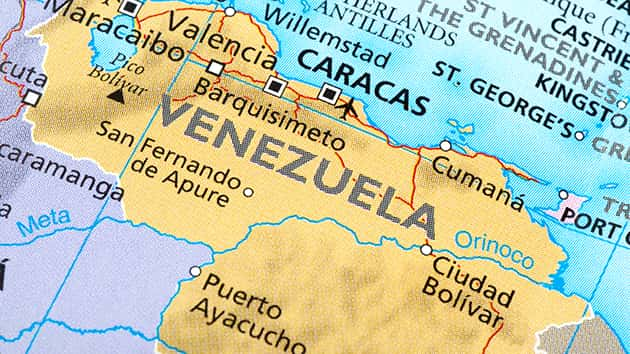
beyhanyazar/iStock
 beyhanyazar/iStock(CARACAS, Venezuela) — The impasse between the government of Nicolas Maduro and the interim government of opposition leader Juan Guaido entered its third day in Venezuela — as both leaders gave defiant national addresses on Friday, and a new report suggested that private military contractors were dispatched from Russia to help beef up Maduro’s security team.
beyhanyazar/iStock(CARACAS, Venezuela) — The impasse between the government of Nicolas Maduro and the interim government of opposition leader Juan Guaido entered its third day in Venezuela — as both leaders gave defiant national addresses on Friday, and a new report suggested that private military contractors were dispatched from Russia to help beef up Maduro’s security team.
The dueling speeches took place hours after a caravan of armored SUVs was seen leaving the American embassy in Caracas, as the deadline imposed by embattled Maduro for American diplomats to leave the country looms.
More than two dozen people have died during protests this week, authorities said, and as of Friday evening local time, 369 protesters had been detained.
The U.S. State Department yesterday ordered all “non-emergency” staff to leave Venezuela, but said the embassy would remain open at the request of the government of Guaido, whom American officials and several governments recognize as the legitimate president of Venezuela.
But on Friday, Maduro reiterated that U.S. diplomats need to leave within the 72 hours he gave them earlier this week, continuing to call this week’s events a “U.S.-orchestrated coup” and casting doubt on U.S. Secretary of State’s Mike Pompeo’s interest in sending humanitarian aid to Venezuela.
Those who want to see Maduro leave office are cheering Guaido’s decision this week to swear himself in as interim president, a move supported by the U.S., Canada, Brazil, and a handful of other countries. But others are calling the National Assembly president’s move a coup d’etat. Both sides fear that the political conflict could spiral into widespread violence and perhaps even a civil war.
As Pompeo prepared for a meeting with the United Nations Security Council, Maduro said he was planning to send his own foreign minister to New York.
“We’re getting ready with the military to defend Venezuela in any scenario that could take place,” he said in a televised address. “I have not abandoned power and I will not abandon it.”
But Venezuela’s Minister of Defense and the head of the military said Thursday that they backed Maduro, while a former Venezuelan official told ABC News that there are growing concerns about the possibility of two warring factions forming within the military.
Maduro also said he had received a request from rival Guaido asking for a meeting with government officials, and that he was willing to meet with him.
For his part, Guaido reaffirmed his commitment to offer amnesty to any and all military and government officials, soldiers and police officers who chose to support his interim government.
Speaking to several hundred people at a public square in Caracas, Guaido — who had not been seen in person since his swearing in Wednesday amid security concerns — made direct appeals to the armed forces and asked them to join what he calls the “only legitimate government” in Venezuela.
“Brothers, I’m talking to you: the time is here, the time is here to work side by side with the constitution, the time is here to respect the people of Venezuela,” he said, as hundreds yelled chants calling Guaido president and Maduro an “usurper.”
Guaido added that his government is making moves towards ensuring that the Maduro regime can’t access the country’s financial assets, from which Guaido claimed Maduro has been pilfering.
“We won’t keep allowing them to steal Venezuela’s government like they’ve been doing for so many years,” he said. “We’ll see what the Armed Forces say when they realize that the usurpers who now live in the Miraflores presidential palace can’t even pay the check, they can’t even pay for their salaries.”
Saying that Venezuela has finally “woken up” from the nightmare it’s been living in for two decades now, Guaido said his movements will stay on the streets until they can guarantee a transitional government and free elections.
Under the Venezuelan constitution, Guaido’s government has 30 days from the moment he was sworn in to hold presidential elections in the country. During his speech Friday, he said the international community’s recognition of his interim government implies a certain degree of trust that he will get the country on the road back to democracy.
Humanitarian aid — he said — was the first step toward helping Venezuelans distressed by the country’s current economic crisis.
“In just two days we achieved what [the Maduro government] couldn’t do in six years -– authorizing the entry of humanitarian assistance,” he said, referring to the $20 million in aid Pompeo pledged yesterday.
Guaido claimed he’s been in communications with other countries to get more help.
Still, the 35-year-old politician remains realistic about the risks of moving forward with his agenda in a country where dissidents are consistently imprisoned or exiled.
“They could put me in jail today, and the Venezuelan people very well know that, as does the world,” he said in an interview on Friday morning. “We know it’s not easy, but we’ll keep on going until we win. We know that the hope that started today in the hearts of millions of Venezuelans is not because of one person, it’s because of the firm belief that we can have a better country.”
Copyright © 2019, ABC Radio. All rights reserved.